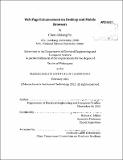| dc.contributor.advisor | Robert C. Miller. | en_US |
| dc.contributor.author | Yu, Chen-Hsiang | en_US |
| dc.contributor.other | Massachusetts Institute of Technology. Department of Electrical Engineering and Computer Science. | en_US |
| dc.date.accessioned | 2013-06-17T19:48:15Z | |
| dc.date.available | 2013-06-17T19:48:15Z | |
| dc.date.copyright | 2012 | en_US |
| dc.date.issued | 2013 | en_US |
| dc.identifier.uri | http://hdl.handle.net/1721.1/79216 | |
| dc.description | Thesis (Ph. D.)--Massachusetts Institute of Technology, Dept. of Electrical Engineering and Computer Science, February 2013. | en_US |
| dc.description | "February 2013." Cataloged from PDF version of thesis. | en_US |
| dc.description | Includes bibliographical references (p. 154-165). | en_US |
| dc.description.abstract | The Web is a convenient platform to deliver information, but reading web pages is not as easy as it was in 1990s. This thesis focuses on investigating techniques to enhance web pages on desktop and mobile browsers for two specific populations: non-native English readers and mobile users. There are three issues addressed in this thesis: web page readability, web page skimmability and continuous reading support on mobile devices. On today's primarily English-language Web, non-native readers encounter some problems, even if they have some fluency in English. This thesis focuses on content presentation and proposes a new transformation method, Jenga Format, to enhance web page readability. A user study with 30 non-native users showed that Jenga transformation not only improved reading comprehension, but also made the web page reading easier. On the other hand, readability research has found that average reading times for non-native readers has remained the same or even worse. This thesis studies this issue and proposes Froggy GX (Generation neXt) to improve reading under time constraints. A user study with 20 non-native users showed that Froggy GX not only enhanced reading comprehension under time constraints, but also provided higher user satisfaction than reading unaided. When using the Web on mobile devices, the reading situation becomes challenging. Even worse, context switches, such as from walking to sitting, static standing, or hands-free situations like driving, happen in reading in on-the-go situations, but this scenario was not adequately addressed in previous studies. This thesis investigates this scenario and proposes a new mobile browser, Read4Me, to support continuous reading on a mobile device. A user study with 10 mobile users showed that auto-switching not only provided significantly fewer dangerous encounters than visual-reading, but also provided the best reading experience. | en_US |
| dc.description.statementofresponsibility | by Chen-Hsiang Yu. | en_US |
| dc.format.extent | 165 p. | en_US |
| dc.language.iso | eng | en_US |
| dc.publisher | Massachusetts Institute of Technology | en_US |
| dc.rights | M.I.T. theses are protected by
copyright. They may be viewed from this source for any purpose, but
reproduction or distribution in any format is prohibited without written
permission. See provided URL for inquiries about permission. | en_US |
| dc.rights.uri | http://dspace.mit.edu/handle/1721.1/7582 | en_US |
| dc.subject | Electrical Engineering and Computer Science. | en_US |
| dc.title | Web page enhancement on desktop and mobile browsers | en_US |
| dc.type | Thesis | en_US |
| dc.description.degree | Ph.D. | en_US |
| dc.contributor.department | Massachusetts Institute of Technology. Department of Electrical Engineering and Computer Science | |
| dc.identifier.oclc | 844753040 | en_US |
